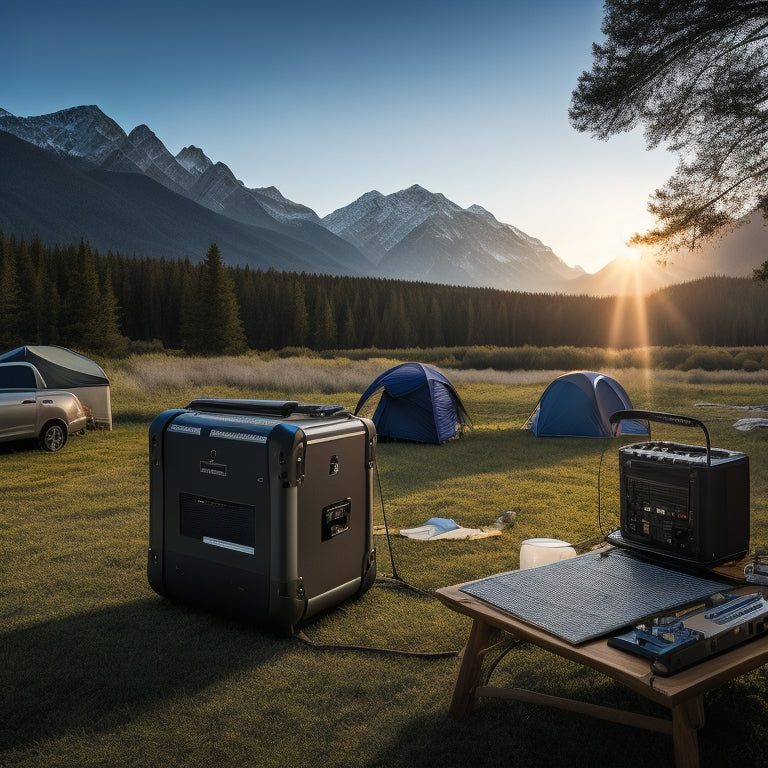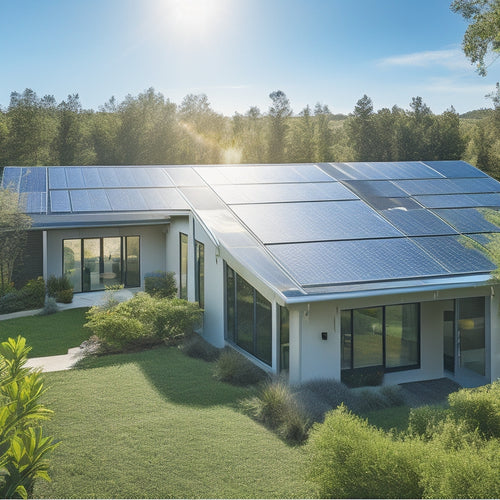
What Event Organizers Need for Off-Grid Energy Kits
Share
You'll need to evaluate variables like attendee headcount, equipment requirements, and event duration to accurately determine your off-grid energy needs, ensuring a reliable and sustainable power supply for your event. Load calculations will help identify the total wattage of appliances to determine power needs. Next, you'll select suitable solar panels, batteries, and inverters to meet those needs, while assessing energy efficiency, power factor, and voltage requirements. By understanding these factors and calculating your power requirements, you'll be well on your way to designing an effective off-grid energy kit, and with further exploration, you'll uncover the specifics to bring your vision to life.
Overview
- Evaluate energy needs by calculating total wattage of appliances, considering attendees, equipment, and event duration to determine power requirements.
- Select suitable solar panels based on energy needs, budget, and space, considering efficiency ratings and types (monocrystalline, polycrystalline, thin-film).
- Choose the right battery type and size, considering energy density, lifespan, and budget, and calculate total battery capacity based on power requirements.
- Ensure proper energy conversion and management with suitable inverters and charge controllers, considering voltage regulation, current limiting, and short-circuit protection.
- Prioritize safety and maintenance by monitoring battery health, conducting risk assessments, and establishing emergency protocols to prevent hazards and ensure system reliability.
Understanding Off-Grid Energy Needs
When planning an outdoor event, your energy needs can be as unpredictable as the weather.
You'll need to take into account the number of attendees, equipment, and duration to determine your power requirements.
To guarantee event sustainability, it's vital to adopt renewable energy and sustainable practices.
Eco-friendly solutions like portable power systems offer energy independence, reducing your environmental impact.
Off-grid solar power systems can be customized to meet specific energy needs, and load calculations identify the total wattage of appliances, determining overall power requirements.
Choosing the Right Solar Panel
You've determined your off-grid energy needs and are ready to assemble the perfect kit for your event. Now, it's time to choose the right solar panel.
There are three main solar panel types to evaluate: monocrystalline, polycrystalline, and thin-film. Monocrystalline panels boast the highest efficiency ratings, typically between 15-20%, but come at a higher cost.
When selecting a solar panel, it's crucial to take into account not only the panel's efficiency but also the charging system's features, such as MPPT and multi-stage charging, to guarantee maximum energy harvesting and efficiency.
Polycrystalline panels offer a slightly lower efficiency rating, around 12-15%, but are more budget-friendly. Thin-film panels have the lowest efficiency ratings, typically around 7-14%, but are the most affordable option.
When selecting a solar panel, reflect on your energy needs, budget, and available space. Look for high-efficiency ratings to maximize energy output and minimize your environmental footprint.
Calculating Power Requirements
To guarantee your off-grid energy kit meets your event's power demands, calculating power requirements is vital.
You'll need to evaluate your event logistics, including the number of attendees, equipment, and duration. Calculate the total power requirement by adding up the wattage of each device, including lights, sound systems, and refrigeration units.
Don't forget to factor in energy efficiency by taking into account the power factor and voltage requirements of each device. To achieve accuracy, it's essential to assess energy needs through total consumption calculation and energy audit.
This will help identify high usage areas and potential reductions. Create a detailed list of your energy needs, and prioritize them based on importance.
This will help you determine the ideal size and configuration of your off-grid energy kit, guaranteeing you have a reliable and efficient power source for your event.
Selecting Suitable Battery Options
With your power requirements calculated, it's time to focus on the heart of your off-grid energy kit: the batteries.
You'll need to choose the right type and size to guarantee reliable power supply. Lithium batteries offer several advantages, including higher energy density, longer lifespan, and lower maintenance. They're ideal for off-grid energy kits due to their ability to handle deep discharge cycles.
When selecting battery types, consider lead-acid, AGM, or lithium-ion options. Lead-acid batteries are cost-effective but heavier, while AGM batteries offer better performance and durability. Lithium-ion batteries provide the best performance but come at a higher cost.
Calculate your total battery capacity by dividing your total power requirement by the desired depth of discharge.
Inverters and Charge Controllers
Between the battery bank and your appliances, two crucial components guarantee efficient and safe energy conversion: inverters and charge controllers.
You'll need an inverter to convert DC power from your batteries to AC power for your appliances. There are three main inverter types: pure sine wave, modified sine wave, and square wave. Pure sine wave inverters are ideal for sensitive electronics.
Charge controllers regulate the flow of energy from your solar panels or wind turbines to your batteries, preventing overcharging or undercharging. Their functions include voltage regulation, current limiting, and short-circuit protection.
Safety Considerations and Maintenance
You'll want to prioritize safety considerations and maintenance to guarantee your off-grid energy kit operates efficiently and securely.
This includes monitoring battery health to prevent overcharging or undercharging, which can lead to reduced lifespan or even fires.
Battery Health Monitoring
The heart of any off-grid energy kit is its battery bank, and monitoring its health is vital to guaranteeing the reliability and safety of your event's power supply.
You need to keep tabs on your batteries' state of charge, voltage, and temperature to prevent overcharging or undercharging, which can reduce their lifespan.
A good battery health monitoring system will provide you with real-time data, enabling you to make informed decisions about energy efficiency.
By monitoring your batteries' health, you can optimize their performance, extend their lifespan, and secure a consistent power supply for your event.
This is significant for maintaining the freedom and independence that off-grid energy kits provide.
Hazard Prevention Measures
Every off-grid energy kit component, including cables, inverters, and batteries, poses a potential hazard if not properly installed, maintained, and monitored.
You must identify and mitigate risks to guarantee a safe and reliable power supply for your event. Conduct a thorough risk assessment to identify potential hazards and develop emergency protocols to address them.
Regular maintenance is essential to prevent electrical shock, fire, or explosion. Check for damaged cables, loose connections, and overheating components.
Establish clear procedures for shutting down the system in case of an emergency. By taking these measures, you'll minimize the risk of accidents and secure a successful event.
Frequently Asked Questions
Can I Use Off-Grid Energy Kits for Indoor Events?
You can't use off-grid energy kits for indoor events that require a steady, high-powered indoor power supply, as they're designed for outdoor events with alternative energy sources, not reliable for sustaining heavy indoor energy demands.
Are Off-Grid Energy Kits Suitable for Multi-Day Events?
You'll want to contemplate off-grid energy kits with high power capacity to sustain your multi-day event, ensuring setup time is minimal to maximize event duration, and opting for kits with scalable designs to adapt to your unique energy needs.
Can I Customize Off-Grid Energy Kits for Specific Event Needs?
You're not limited to one-size-fits-all energy solutions! You can tailor custom energy solutions to fit your event's unique needs, combining portable power options to guarantee your off-grid energy kit is as unique as your event itself.
Are Off-Grid Energy Kits Environmentally Friendly?
You'll find that off-grid energy kits are environmentally friendly, offering sustainability benefits by utilizing renewable sources like solar, wind, or hydro power, reducing your carbon footprint and reliance on fossil fuels, giving you the freedom to power your events with a clear conscience.
Do Off-Grid Energy Kits Come With Warranties or Guarantees?
You demand reliability, so you'll want to know that off-grid energy kits often come with warranty terms that guarantee durability and performance assurances that safeguard your investment, giving you the freedom to power your events with confidence.
Ready to Buy
As you initiate your off-grid energy expedition, remember that a well-designed kit is the key to revealing a seamless event experience. Like a skilled conductor leading an orchestra, each component must work in harmony to produce a melody of power. By understanding your energy needs, selecting the right solar panels, calculating power requirements, choosing suitable batteries, and considering safety and maintenance, you'll be well on your way to creating an off-grid energy kit that shines brighter than the brightest stage light.
Related Posts
-

How to Achieve a Zero-Waste Lifestyle for a Greener Tomorrow
To achieve a zero-waste lifestyle, start by adopting the principles of refusing, reducing, reusing, and recycling. Sw...
-

Essential Hiking Lights for Safety and Fun
When you're hitting the trails, essential hiking lights are vital for safety and fun. A lightweight headlamp offers h...
-

Installing Metal Solar Roofs for Maximum Energy Efficiency
Installing metal solar roofs can drastically enhance your home's energy efficiency and durability. These roofs withst...


